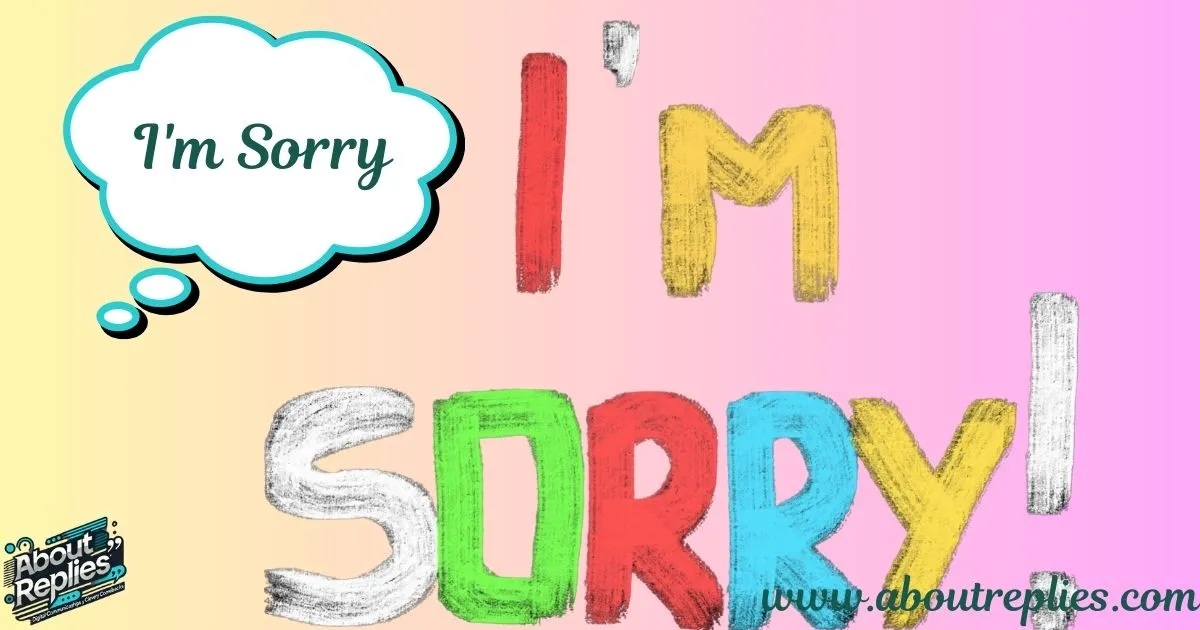“A heartfelt apology can be the beginning of a stronger connection, but responding with grace is the key.”
In life, we all make mistakes. Apologies are an essential part of acknowledging these mistakes and moving forward. When someone says, “I’m sorry,” it’s not always easy to know how to respond. However, your response can influence the outcome of the relationship and foster healing.
Be it a friend, family member, colleague, or even a stranger, knowing how to respond can help rebuild trust and strengthen bonds. Understanding the power of forgiveness, healing, and clear communication is crucial when navigating these moments.
Have you ever struggled with how to respond to an apology? Responding appropriately can make a big difference in mending relationships. In this blog post, we will explore over 85 responses to “I’m sorry” that can help you move forward and create more understanding in your relationships. By embracing the power of grace and effective communication, you can begin to heal, forgive, and strengthen your connections with others.
An apology can take many forms, but your response is just as important as the words that come before it. Acknowledge the effort someone puts into apologizing, understand the situation, and choose the best approach to respond.
A well-thought-out reply can offer healing, help in overcoming challenges, and even pave the way for personal growth. Let’s dive into different scenarios and the best ways to respond, ensuring that we communicate in a way that is respectful and constructive.
Graceful Acceptance: The Foundation of Healing
Responding to an apology with graceful acceptance is essential for healing. When someone offers a sincere apology, accepting it with an open heart is a powerful way to show that you are ready to move forward. This can be incredibly freeing, as it helps clear any lingering resentment and promotes emotional well-being.
- Embrace the sincerity of the apology with a calm demeanor.

- Acknowledge the effort they put into apologizing.
- Let go of past grudges that could hinder your emotional health.
- Express understanding of their feelings and position.
- Avoid holding onto resentment after accepting the apology.
- Focus on moving forward rather than rehashing the past.
- Let the person know you appreciate their effort to make amends.
- Reassure them that their apology is heard and appreciated.
- Make it clear that you are willing to rebuild the trust.
Read More: Thank You for Letting Me Go Reply!(2025)
Acknowledging Efforts to Make Amends
When someone apologizes, it’s important to recognize the effort they made to correct their mistake. Acknowledging their efforts helps build trust and shows that you appreciate their desire to make things right. This step can be a pivotal moment for the person apologizing to feel validated.
- Acknowledge their vulnerability in admitting their mistake.
- Express gratitude for their willingness to apologize.
- Recognize their actions to correct the situation.
- Assure them that their efforts are not overlooked.
- Show appreciation for their commitment to making amends.
- Encourage positive behavior for the future.
- Acknowledge that their apology shows their growth.
- Share how their apology impacts your emotional well-being.
- Reinforce the idea that healing is a shared process.
Encouraging Open Communication

Responding to an apology can open the door to deeper communication. Encouraging an open and honest conversation about the issue at hand helps prevent future misunderstandings and strengthens relationships. It’s important to create a safe space for both sides to express their feelings freely.
- Listen actively to their side of the story.
- Respond with empathy to their feelings.
- Avoid interrupting, and give them space to explain themselves.
- Be open-minded about their perspective.
- Clarify your feelings and how their actions affected you.
- Ask for their thoughts on how to avoid repeating the situation.
- Share your own ideas for moving forward together.
- Focus on respectful communication rather than blaming.
- Create an environment where both parties feel heard.
Moving Forward: Rebuilding and Strengthening Relationships
After an apology, it’s crucial to focus on the future. Moving forward with a renewed sense of trust and mutual respect helps rebuild the relationship. Take steps to ensure that past mistakes don’t hold you back, and work together to build a better connection.
- Let go of past mistakes and start fresh.
- Set new boundaries to avoid repeating the same issues.
- Discuss how to prevent similar problems in the future.
- Show gratitude for their efforts in trying to make things right.
- Embrace the opportunity to grow together.
- Focus on positive actions that promote trust.
- Acknowledge any changes in both parties’ behaviors.
- Keep the lines of communication open to maintain mutual respect.
- Work towards building a healthier relationship with time.
Handling Complex Situations
Sometimes, an apology comes after a complex situation. It’s important to handle these moments carefully. The emotions may run high, and there may be a lot of unresolved issues at play. A thoughtful response can make all the difference in these circumstances.
- Take your time before responding if needed.
- Recognize the complexity of the situation.
- Respond in a way that avoids emotional overload.

- Don’t let hurt feelings cloud your response.
- Address the root cause of the problem.
- Be patient as both sides process the situation.
- Separate personal emotions from the apology.
- Ask for clarification if certain aspects remain unclear.
- Seek understanding rather than focusing on blame.
Professional Settings: Apologies in the Workplace
In the workplace, apologies are often a part of professional life. Responding to a colleague’s apology with professionalism and understanding can help maintain a positive work environment. It’s important to maintain boundaries and avoid letting personal issues interfere with work relationships.
- Respond with a calm and composed demeanor.
- Acknowledge their effort to resolve the issue.
- Maintain a professional tone at all times.
- Avoid bringing personal emotions into the conversation.
- Use the apology as an opportunity to strengthen teamwork.
- Clarify any expectations for moving forward in the work environment.
- Stay objective about the situation to avoid future conflicts.
- Set a positive example by handling apologies respectfully.
- Reinforce the importance of mutual respect at work.
Cultural Considerations: Apologies Across Cultures
Different cultures have unique approaches to apologizing. In some cultures, saying “I’m sorry” is a formal part of the social code, while in others, actions speak louder than words. Understanding these cultural differences can help you respond with greater empathy and understanding.
- Be mindful of cultural differences in how apologies are made.
- Understand the depth of the apology in different cultures.
- Respect the traditions of apology practices.
- Avoid misinterpreting non-verbal gestures.
- Understand that actions may matter more than words in some cultures.
- Show appreciation for their effort regardless of cultural differences.
- Be patient with language barriers in the apology process.
- Ask questions to better understand their apology style.
- Maintain an open heart to embrace cultural diversity.
The Power of Humor: Lightening the Mood

Sometimes, a little humor can go a long way in responding to an apology. It can help ease tension and create a more comfortable atmosphere. However, it’s important to be cautious and ensure that humor doesn’t undermine the sincerity of the apology.
- Gauge the situation before introducing humor.
- Use humor to relieve tension, not to mock the situation.
- Ensure that your humor is appropriate to the context.
- Let the other person know that you are not holding a grudge.
- Make light-hearted jokes that help both sides move past the issue.
- Avoid humor that could make the other person feel worse.
- Acknowledge the seriousness of the apology before lightening the mood.
- Keep your humor respectful and avoid sarcasm.
- Make sure the other person is comfortable with the light-heartedness.
When You’re Not Ready: Taking Time to Process
Sometimes, you may not be ready to forgive or respond immediately. It’s okay to take time to process your feelings. Let the person know that you need some space to think things through. This can give both sides the time they need to reflect and approach the situation more thoughtfully.
- Communicate your need for space without sounding dismissive.
- Let the person know that you appreciate their apology.
- Take time to reflect on your own feelings and thoughts.
- Use this time to gain clarity on the situation.
- Avoid rushing into a response before you’re ready.
- Recognize that healing takes time and can’t be rushed.
- Respect both your emotions and theirs during this time.
- Be patient with yourself while processing.
- Revisit the conversation when you’re ready to move forward.
Responding to “I’m Sorry” Text
- “It’s okay, don’t worry about it!”
- “No need to apologize. We’re good.”
- “I appreciate the apology, thank you.”
- “It’s all water under the bridge now.”
- “Mistakes happen, no hard feelings.”
- “Thanks for saying that. It means a lot.”
- “I understand, let’s move forward.”
- “It’s okay, we can work it out together.”
- “Don’t stress too much about it. We’re fine.”
- “Apology accepted, let’s leave it behind us.”
How to Reply to Sorry Formally
- “Thank you for your apology. I appreciate it.”
- “I understand, and I accept your apology.”
- “Your apology is noted and appreciated.”
- “Thank you for addressing this. Let’s move forward.”
- “I appreciate your honesty. Let’s resolve this together.”
- “It’s good to hear from you, and I accept your apology.”
- “Thank you for taking the time to apologize.”
- “Apology acknowledged. Let’s work on a solution.”

- “Your apology shows accountability, and I respect that.”
- “Thank you for your apology. I’m glad we could address this.”
What to Say When Someone Apologizes Over Text
- “I appreciate your apology. Let’s move on.”
- “No worries, I know you didn’t mean it.”
- “It’s all good! Thanks for saying sorry.”
- “That’s okay, everyone makes mistakes.”
- “Thank you for apologizing. It means a lot.”
- “I know you feel bad, but it’s not a big deal.”
- “I forgive you; let’s not dwell on it.”
- “Thanks for reaching out to apologize.”
- “We’re fine. Let’s just move forward.”
- “I understand. No hard feelings at all.”
Funny Reply to Sorry
- “I’ll think about forgiving you… over some pizza!”
- “I accept your apology, but only if there’s chocolate involved.”
- “Wow, you must’ve practiced that apology in the mirror!”
- “Apology accepted, as long as you owe me one joke!”
- “I forgive you… just this once.”
- “Sorry? I didn’t even notice you messed up!”
- “Okay, but don’t let it happen again… unless it’s funny.”
- “Sure, I forgive you. Just buy me tacos next time.”
- “I’ll forgive you, but my sarcastic comments will be remembered.”
- “Apology accepted. Now do 10 pushups as penance!”
Responding to “I’m Sorry” Quotes
- “That’s a heartfelt quote; I truly appreciate it.”
- “Your words mean a lot, thank you for sharing.”
- “Such a thoughtful way to apologize. Thank you!”
- “This quote really shows how sincere you are.”
- “I can tell this apology came from the heart. Thank you.”
- “This is beautiful. I accept your apology.”
- “What a meaningful way to say sorry. It’s appreciated.”
- “Your apology feels so genuine. Thank you for sending this.”
- “This quote speaks volumes. Apology accepted.”

- “You’ve said it beautifully, and I forgive you.”
Answer and question
What’s the best way to respond when someone apologizes?
Acknowledge the apology, express your feelings honestly, and focus on healing.
How do I handle an apology in a professional setting?
Respond respectfully, acknowledge the effort to resolve the issue, and focus on moving forward.
Can humor be used in responding to an apology?
Yes, but it’s important to be sensitive and ensure that the humor doesn’t undermine the sincerity of the apology.
What if I’m not ready to forgive?
It’s okay to take time to process your emotions before responding. Let the person know you need space.
How do I respond to a complex apology?
Take time to reflect on the situation, listen actively, and communicate your feelings clearly.
Wrap-Up
In conclusion, responding to an apology with thoughtfulness and grace can help foster healing and strengthen relationships. By accepting the apology, acknowledging efforts to make amends, encouraging open communication, and moving forward with respect, you can create a more harmonious connection.
It’s essential to recognize the importance of empathy in these moments and allow space for reflection when needed. It’s in personal or professional relationships, your response plays a crucial role in shaping the future of that bond. Remember, responding with sincerity and understanding can lead to growth, trust, and a more positive connection.

Hi! I’m Jane Austen – With a classic flair for sharp, clever responses, I blend timeless wit with modern humor. My comebacks are crafted to be both thoughtful and entertaining.

